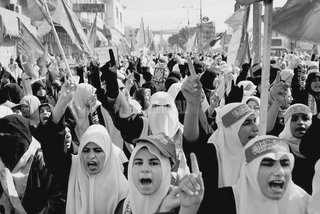This is an excellent chronicle about a book of the second intifada... ENJOY THE COMMENTS OF THE EXPERTS!
By Ramzy Baroud (Extracted of
http://www.palestinechronicle.com/spi.php)
Few are spared [Baroud's] perceptive eye, and only the morally callous will fail to respond to his pleas to remedy the injustice that he exposes.Professor Noam Chomsky, Massachusetts Institute of Technology
A compelling narrative of Palestinian victimization [presented] with candor and uncompromising integrity.Dr. Hanan Ashrawi, Palestinian Legislator for the Jerusalem District
'Masterful prose. ... (A) scathing but heartfelt portrait.' Professor Norman G. Finkelstein, author of The Holocaust Industry
Description
The Second Palestinian Intifada: A Chronicle of a People's Struggle is Ramzy Baroud's comprehensive account of the momentous events of the last five years which shaped the political landscape not only of Palestine and Israel but of the entire Middle East region. Addressing the most controversial issues, including the alarming escalation in suicide bombings, and the construction of the Separation Wall, he reports on the huge rate of unemployment and hunger in the Occupied Territories' statistics so critical that NGOs compare their magnitude to African nations such as the Congo. From the brutality of the Israeli army to the ever-compromising nature of the Palestinian Authority, few are spared Baroud¹s thoughtful critique. The book is clear and concise, with one chapter dedicated to the major events of each year, and includes a comprehensive timeline.
Praise for "The Second Palestinian Intifada"
Hanan Ashrawi: "Ramzy Baroud's work is a unique fusion of heart and mind, of passionate commitment and analytical intellect, of profound introspection and expansive criticism. With searing honesty, Baroud has the courage to broach subjects that are often excluded from public scrutiny or buried under piles of prejudice, cowardice, and taboos. His volume presents a compelling narrative of Palestinian victimization without being defensive or apologetic, and with no attempt at disguising or denying internal weaknesses and shortcomings. In the same way, Baroud exposes Israeli culpability, American duplicity, and international abrogation of responsibility with candor and uncompromising integrity.
All those who seek to grasp the underlying realities of the Palestinian question and to gain a greater understanding of the turbulent Middle East must read this book. I must caution, however, that it is not for those who hide behind self-delusion, platitudes, or convenient sound bites. This book is for those who have the courage to seek the truth behind the facts and are willing to embark on an unconventional (and often uncomfortable) journey of discovery."
Noam Chomsky: "Ramzy Baroud's searching, sensitive and thoughtful writing penetrates to the core of moral dilemmas that their intended audiences evade at their peril. He calls on us to face our immense responsibility for the bitter suffering of Palestinians, shamefully ignored by those who are quick to condemn the violence it elicits.
He reminds us of things it is more convenient "not to see" or to quickly forget, such as the ruling of the International Court of Justice calling on all states to oppose Israel's illegal actions in the territories under military occupation.
"All states" includes the state that provides the crucial military, diplomatic, and economic support for these continuing atrocities, and the judgment extends to all of those who tolerate what Washington and its client do, either in silence, or worse, approval and apologetics.
He calls on Palestinians to refrain from criminal terror, however shameful their brutal mistreatment over decades, and to recognize the corruption and venality of the quasi-governmental structures that are leading them to disastrous submission to violations of their most elementary rights.
Few are spared his perceptive eye, and only the morally callous will fail to respond to his pleas to look into the mirror honestly, to question comforting beliefs that protect us from facing our elementary responsibilities, and to act to remedy the terrible misery and injustice that he exposes to our view, as we surely can."
Norman Solomon: "Ramzy Baroud offers clarity about what remains in the shadows of Western media coverage. He illuminates a process of propaganda that combines with political machinations and military suppression to violate the most basic human rights of Palestinian people.
The value of his Writings on the Second Palestinian Uprising can be appreciated as a refutation of the clichés and arrogance that so often turn ostensible journalism into rationalizations for Israeli policies.
The awful truths in Baroud's essays are unacceptable to those who prefer to rely on euphemism and evasion. For the rest of us, his willingness to expose what cannot stand the light of day is a real service to movements for human rights everywhere."
Norman G. Finkelstein: "In this curious blend of passionately subjective yet dispassionately objective journalism, Ramzy Baroud chronicles the unfolding of the second Intifada in masterful prose.
Almost no one is spared his caustic pen: neither the brutal rampages of Israelis through Khan Yunis and Jenin nor the dirty backroom deals of Palestinian leaders selling Israel cement for the Apartheid Wall. Only the Palestinian people, in their quiet, grim determination, emerge from Baroud's scathing but heartfelt portrait with dignity intact."
Labels: Intifada, Palestine








